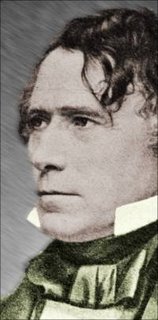
Deeply concerned about “the Cuba question,” President Franklin Pierce appointed Alexander Clayton of Delaware as a special agent to Havana in 1853, (the year José Martí was born) to look into the possibility that a treaty between England, France and Spain intended to “Africanize” Cuba. Clayton could find no such treaty, and reported so to Pierce, who sent a second agent, Charles W. Davis, in March of the following year.
In the 1850s the Cuban question, as posed by expansionists and other patriots of the Southern cause, involved whether annexation of Cuba by military force was “better” than annexation of Cuba through a financial acquisition. Both options had their champions, and there was always the possibility that if one way didn’t work, there was always the other. The end result seemed unquestionable.
Here are some choice quotes from that time:
From the Tuskegee Republican, 1/7/1858:
“The shores of the Pacific and the great central desert of North America already bound our development westward, and it must turn southward, where decaying nations and races invite our coming. Small philosophers may harp upon moral rights here, as they do in Europe, but it will produce no more effect upon the march of races in America, Africa, or Asia, than whistling has upon the wind.”
From the Texas Republican, 1/28/1859:
“Were Cuba annexed, Havanna [sic] would speedily become the great entrepot of southern commerce, and in a few years be the rival of New York itself. It would be the nucleus around which would cluster the trade of all the Gulf and many of the South American ports; of all the Isthmus; and also of the Asiatic and East Indian ports… There is no telling what an immense city Havanna [sic] would become. And she would be a Southern city, a slaveholding city.”
Senator Albert Gallatin Brown, March,1860:
“I want Cuba, and I know that sooner or later we must have it… I want Tamuaulipas, Potosi, and one or two other Mexican States; and I want them all for the same reason—for the planting or spreading of slavery. And a foothold in Central America will powerfully aid us in acquiring those other States… Yes I want these Countries for the spread of slavery.”
Some Southerners openly opposed imperialism, the invasion and/or acquisition of Cuba, and slavery in general. But just imagine how much courage was necessary to express such views in those days.
One hundred and fifty-three years after President Pierce’s concerns over Cuba , a presidential commission is officially looking at a post-Castro Cuba, just as if she was the U.S. “protectorate” that Senator Brown would have gladly settled for.
Peace



0 Comments:
Post a Comment
<< Home